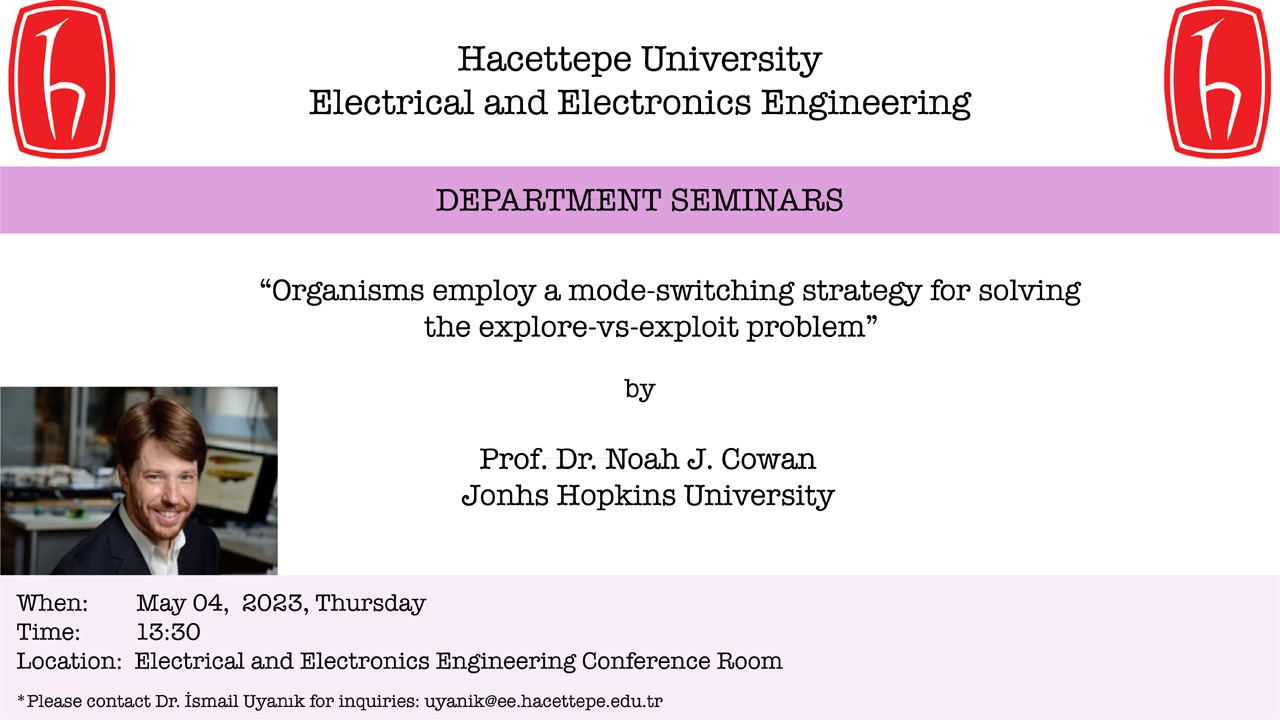Announcements
SEMINAR: Organisms employ a mode-switching strategy for solving the explore-vs-exploit problem, Prof. Noah J. Cowan, Thursday, May 4, 2023, 13:30, Department's Conference Hall
April 28, 2023
Within the department's seminar series, Prof. Dr. Dr. Noah J. Cowan from Johns Hopkins University, USA, will make a talk titled "Organisms employ a mode-switching strategy for solving the explore-vs-exploit problem".

All interested are invited.
For your questions and comments:
Dr. İsmail Uyanık, [email protected]
ABSTRACT
Movement and sensing are linked in organisms as their sensors are embedded in their bodies. This inescapable link results in a behavioral conflict between producing costly movements for gathering information ("explore") versus using previously acquired information to achieve a goal ("exploit"). Optimally trading-off exploration and exploitation is typically an intractable problem, and the strategies that animals utilize to resolve this conflict are poorly understood. Here we show that weakly electric fish (Eigenmannia virescens) use a mode-switching strategy that solves the exploreexploit conflict during a refuge tracking task and show that this strategy is modulated by sensory salience. Fish produced distinctive non-normal distributions of movement velocities characterized by sharp peaks for slower, task-oriented "exploit" movements and broad shoulders for faster, "explore" movements. Surprisingly, measures of non-normality increased (rather than decreased) in relation to increased sensory salience. Reanalysis of published data revealed that this distinctive distribution of movement velocities is produced by phylogenetically diverse organisms, from amoeba to humans. Further, other species exhibited the same counter-intuitive modulation of mode-switching in relation to sensory salience. We propose a parsimonious, state-uncertainty based mode-switching heuristic that reproduces the distinctive velocity distribution and explains its relationship to sensory salience. This mode-switching strategy likely manifests in diverse biological mechanisms, from cellular processes for single-cell motility to network-level processes for the control of movement in animals.
Talk will be based largely on this preprint: https://www.biorxiv.org/content/10.1101/2023.01.11.523566v1
BIOGRAPHY
Noah J. Cowan received a B.S. degree from the Ohio State University, Columbus, in 1995, and M.S. and Ph.D. degrees from the University of Michigan, Ann Arbor, in 1997 and 2001 - all in electrical engineering. Following his Ph.D., he was a Postdoctoral Fellow in Integrative Biology at the University of California, Berkeley for 2 years. In 2003, he joined the mechanical engineering department at Johns Hopkins University, Baltimore, MD, where he is now a Professor. Prof. Cowan's research interests include mechanics and multisensory control in animals and machines. Prof. Cowan received the NSF PECASE award in 2010, the James S. McDonnell Foundation Scholar Award in Complex Systems in 2012, and two Johns Hopkins Discovery Awards in 2015 and 2016. In addition, Prof. Cowan received the William H. Huggins Award for excellence in teaching in 2004, and the Dunn Family Award in 2014, conferred for having "... an extraordinarily positive impact upon the lives of one or more undergraduate students."
Seminar Date: Thursday May 4, 2023
Seminar Time: 13:30
Seminar Place: HU Dept. of EEE, Conference Hall
For your questions and comments:
Dr. İsmail Uyanık, [email protected]
ABSTRACT
Movement and sensing are linked in organisms as their sensors are embedded in their bodies. This inescapable link results in a behavioral conflict between producing costly movements for gathering information ("explore") versus using previously acquired information to achieve a goal ("exploit"). Optimally trading-off exploration and exploitation is typically an intractable problem, and the strategies that animals utilize to resolve this conflict are poorly understood. Here we show that weakly electric fish (Eigenmannia virescens) use a mode-switching strategy that solves the exploreexploit conflict during a refuge tracking task and show that this strategy is modulated by sensory salience. Fish produced distinctive non-normal distributions of movement velocities characterized by sharp peaks for slower, task-oriented "exploit" movements and broad shoulders for faster, "explore" movements. Surprisingly, measures of non-normality increased (rather than decreased) in relation to increased sensory salience. Reanalysis of published data revealed that this distinctive distribution of movement velocities is produced by phylogenetically diverse organisms, from amoeba to humans. Further, other species exhibited the same counter-intuitive modulation of mode-switching in relation to sensory salience. We propose a parsimonious, state-uncertainty based mode-switching heuristic that reproduces the distinctive velocity distribution and explains its relationship to sensory salience. This mode-switching strategy likely manifests in diverse biological mechanisms, from cellular processes for single-cell motility to network-level processes for the control of movement in animals.
Talk will be based largely on this preprint: https://www.biorxiv.org/content/10.1101/2023.01.11.523566v1
BIOGRAPHY
Noah J. Cowan received a B.S. degree from the Ohio State University, Columbus, in 1995, and M.S. and Ph.D. degrees from the University of Michigan, Ann Arbor, in 1997 and 2001 - all in electrical engineering. Following his Ph.D., he was a Postdoctoral Fellow in Integrative Biology at the University of California, Berkeley for 2 years. In 2003, he joined the mechanical engineering department at Johns Hopkins University, Baltimore, MD, where he is now a Professor. Prof. Cowan's research interests include mechanics and multisensory control in animals and machines. Prof. Cowan received the NSF PECASE award in 2010, the James S. McDonnell Foundation Scholar Award in Complex Systems in 2012, and two Johns Hopkins Discovery Awards in 2015 and 2016. In addition, Prof. Cowan received the William H. Huggins Award for excellence in teaching in 2004, and the Dunn Family Award in 2014, conferred for having "... an extraordinarily positive impact upon the lives of one or more undergraduate students."

